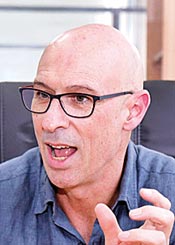Sri Lanka should look at securing its athletes’ natural steps towards an elite career – Prof Russell
A well-known Exercise and Nutritional Scientist, Prof. Aaron Russell highlights the importance of focusing on data analytics to improve skills of sportsmen and women. Professor Russell, the Associate Head of School (International) of School of Exercise and Nutrition Sciences, Institute for Physical Activity and Nutrition of Faculty of Health at the Deakin University in Australia was recently in Sri Lanka and visited the University of Kelaniya and several other places including Walala A. Ratnayake College–one of the leading sports school in the country.
He said that students of sports science could be placed within school sport teams, a local sport teams or even a professional team or an elite sport training institute to advice coaches and players or even to collect data.

Prof. Aaron Russell
“They might use the knowledge they have gained in the area of strength and condition to develop a periodised strength training programme for their team, or assist with a specialised exercise rehabilitation programme. They may also develop a conditioning programme to improve speed or endurance of the athletes,” Prof. Russell said.
“An emerging area is data analytics. A motivated sports science student may be able to collect and analyse data to provide training advice to coaches. This would help develop the applied skills of the sports science student as well as enhance the training quality of the athletes,” he noted.
Prof. Russell stated that he was highly impressed by the overall enthusiasm of Sri Lankan athletes. This was after a series of interactions he had with stakeholders of sports during his recent visit.
“Sri Lanka appears to have a well-established sporting pathway for many aspiring athletes, across many sports. This is especially seen at the school level, with the large number of schools providing scholarship opportunities for talented athletes,” he said.
“I was appreciative of the opportunity to visit Walala A. Rathnayake Central College and meet several of their athletes. I was also warmly welcomed to an ‘A’ grade basketball match in Colombo that involved several players in the men’s national team. It was of a very high standard. Everybody I met was very enthusiastic about developing sporting opportunities for emerging athletes,” he said.
He also met with sports teachers, coaches and athletes besides meeting a number of professionals and representatives from universities, where he discussed matters related to sports science and its integration into local sports.
“I was fortunate to meet with several sports teachers, coaches and academics from the sports science field. Everybody I spoke with was passionate about sports science and how it can improve the performance of athletes. I was also pleased to hear that some of the people I met mentioned the role of sports science in promoting the wider population, from young children through to older members of the community, to become more physically active. I think is an area that should be given more consideration”.
Prof. Russell pointed out that universities could play an active role in developing sports and sport science careers in Sri Lanka.
“Sports science and exercise science are very different to each other. At Deakin University our School of Exercise and Nutrition Sciences has developed a work integrated learning and placement programme into our Exercise and Sports Science degrees. I strongly recommend this be considered in Sri Lanka,” he added.
He also said that sports and exercise science students could also become a positive impact of the health of the wider community. For that he said students could work with local community groups or local government to develop strategies to promote sports and physical activity within the general population. Hospitals and medical clinics could be connected to provide specific exercise programmes for individuals or small groups according to the expert.
Hailing from a country a sport culture, the Australian said he saw many similarities between the two nations–Sri Lanka and Australia with regard to adopting best practices in sports science.
“The similarity lies with the passion for sport that is seen in both Australia and Sri Lanka and how much joy and sometimes frustration, it brings to many within the community. Sri Lanka also has a well-established pathway from young athletes to become the best they can. However, I am not sure what happens to athletes if they find themselves not taking the natural steps towards an elite career. Young people develop at different rates and can have setbacks for various reasons. Are there opportunities for these athletes to keep playing high level sport and receive coaching and physical conditioning so that in a few years into the future they will have improved and still might considered for elite level sport. This keeps more people involved in sport for a longer period, increasing the possibility of developing more quality athletes,” he stated in conclusion.
The writer is a Senior Lecturer and the Head of Department of Sport Science and Physical Education of the Faculty of Social Sciences at University of Kelaniya.


